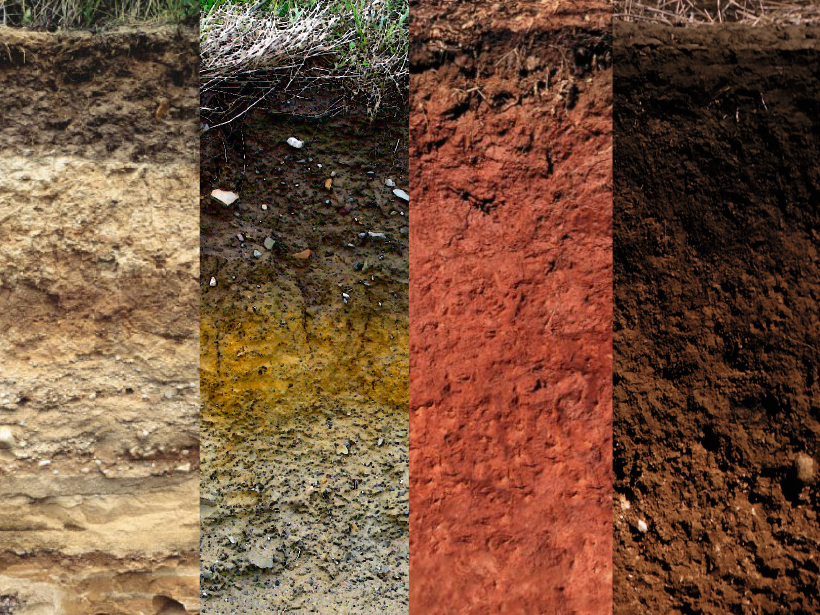Human security and existence are inextricably linked to soils. Soil is the thin skin of the Earth that provides essential ecosystem services that all terrestrial life forms depend on.
Humans—through intensive cultivation, deforestation, overgrazing, chemical pollution, etc.—are damaging soils.
However, humans—through intensive cultivation, deforestation, overgrazing, chemical pollution, etc.—are damaging soils. The adverse effects of this damage are immense and include reduction in soil stability, productivity, and organic matter storage in soil. Pollution of soil can infiltrate to surface water and groundwater systems and can lead to eutrophication of aquatic bodies and bioaccumulation in plants.
Soils are connected to some of the world’s greatest environmental challenges, including climate change, water quality and quantity, food security, environmental contamination, and ecosystem health. Unfortunately, many people do not understand or appreciate soil’s critical support of life on Earth or how long it takes for soil to recover and renew after depletion.
To increase soil awareness and promote soil sustainability, the United Nations designated 5 December as World Soil Day, and the International Union of Soil Sciences declared 2015–2024 the International Decade of Soils. To mark these events, the U.S. National Academy of Sciences’ National Committee for Soil Sciences (USNC/SS) organized a World Soil Day workshop at the National Academy of Sciences (NAS) in Washington, D. C.
Participants explored the roles soils play in sustaining life through contributions to food security, water resources, human health, biodiversity, environmental change, and national security.
To illuminate the importance of soil, the workshop gathered interested stakeholders from academia, business, and government sectors. Policy makers, nonprofit foundations, and government agencies participated in the workshop, alongside experts from the major fields of soil science. Approximately 160 people attended, both in person and virtually.
The workshop opened with an announcement from the White House Office of Science Policy and Technology about the launch of a Framework for a Federal Strategic Plan for Soil Science. Speakers and breakout session participants explored the multidimensional roles soils play in sustaining life through contributions to food security, water resources, human health, biodiversity, environmental change, critical infrastructure, and national security.
Through presentation and discussion, speakers highlighted several key points during the workshop, including the following:
- Human health is directly linked to healthy soils through nutrition, provision of antibiotics, and provision of essential nutrients.
- Soil controls water availability and quality.
- Urban areas depend on soil for construction, sanitation and waste disposal, water quality, urban gardens, and carbon sequestration.
- Soil is the foundation for food and nutritional security.
- Soil and soil biota regulate waste and nutrient recycling, including for biosolids and plant essential nutrients in both pristine and highly managed landscapes.
- Soil regulates our climate through its ability to store and stabilize carbon and to control emission of greenhouse gases to the atmosphere.
Workshop participants identified several positive steps that can be taken to highlight the importance of soil in scientific research and in the educational, policy, and social arenas. The workshop emphasized the need to communicate soil’s importance for the security and viability of natural systems to a wider community of stakeholders beyond soil scientists. Participants also discussed the best approaches for promoting better soil science education and sustainable management of soil resources. The USNC/SS will work to implement these suggestions and will strive to foster a dialogue with policy makers.
Presentations and video recordings from the workshop are available on the NAS website. A brief NAS workshop proceeding will be published by the National Academies Press in the summer of 2017.
—Asmeret Asefaw Berhe (email: [email protected]), University of California, Merced; Ronald Amundson, University of California, Berkeley; and A. Ester Sztein, National Academies of Sciences, Engineering, and Medicine, Washington, D. C.
Citation:
Berhe, A. A.,Amundson, R., and Sztein, A. E. (2017), Healthy soils for healthy societies, Eos, 98, https://doi.org/10.1029/2017EO077201. Published on 06 July 2017.
Text © 2017. The authors. CC BY 3.0
Except where otherwise noted, images are subject to copyright. Any reuse without express permission from the copyright owner is prohibited.

